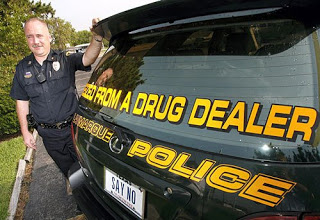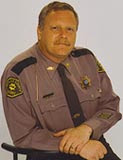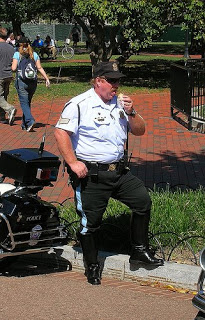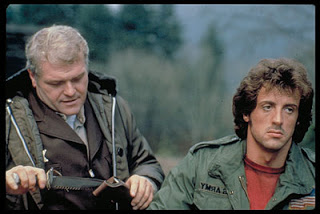Monday, July 7, 2008
Banditti in Blue

(Thanks to the Strike The Root blog.)
A robber poses with his loot: The lucrative racket called “asset forfeiture,” in which police steal money, cars, homes, and other valuables without convicting their owners of crimes, is a major reason why the fraudulent “War on Drugs” continues.
David Seward’s problem wasn’t his greed. It was his inability to transmute that greed into public policy.
Until August 2006, Seward was Chief of Police for the town of Troy, Texas (pop. circa 1,400). As I noted in this space shortly after the event, Seward was fired — along with the three other officers who composed the police force — amid accusations that he had misappropriated funds “seized during criminal investigations.” Specifically, the money was confiscated after drugs were found in a car during a traffic stop.
He allegedly blew a relatively trivial sum — described in the misdemeanor criminal complaint as “more than $500 and less than $1,500” — on clothes, meals, gasoline, a rental car, vacations, and an embroidery machine (presumably for his wife).
For a brief period, Troy was deprived of the dubious protection of a police force, relying instead on the Bell County Sheriff’s Department. Regrettably, the City Council reversed itself and reconstituted the police force.
Although Seward was arrested and booked on the theft charge earlier this year, he failed to appear for a June 11 court appearance and his current whereabouts are unknown.
Although he is the subject of an arrest warrant, the prosecutor very generously declined to tack on a “failure to appear” charge, as he doubtless would were the accused a mundane, rather than a former police chief. Furthermore, Bell County assistant prosecutor Ken Kalafut “did not know if law enforcement officers were actively seeking Seward,” reported the Waco Tribune.
It’s obvious that capturing Seward is not a pressing priority for his successors. After all, asset forfeiture — the seizure of cash, cars, homes, and other valuables from people who are often neither convicted of, nor charged with, a criminal offense — is a huge business in Texas, netting some $125 million for police agencies last year.
With such sums slopping police troughs across the state, it’s impossible to believe that Seward’s piffling misuse of a few hundred dollars here and there was the most serious instance of official corruption involving “forfeited” money. If he had somehow been able to swaddle his avarice in a serviceable bureaucratic rationale, Seward would still have his job.

This provides a ready-made rationale for seizing cash and other pelf from “suspicious” motorists, and anybody else who blunders into a traffic stop in or near Troy. In fact, according to a recent federal court ruling, the mere possession of a large amount of cash by a motorist provides sufficient justification for its seizure by law enforcement.
If he’d been blessed with a gift for “creative writing,” or had the minimal self-control to avoid stealing small amounts of money, Seward could have turned his four-man police force into a lucrative shake-down outfit: A small town sitting astride a major interstate in the middle of nowhere would have been an ideal speed trap, and every traffic stop would be a chance for a big haul.

That’s how things worked for the Sheriff’s Department of Dallas County, Iowa, located along Interstate 85, which is perhaps the country’s most heavily traveled East-West freeway. Under the direction of former Sheriff Brian Gilbert, the Dallas County Sheriff’s Department hauled in millions over the course of several years — and then Gilbert got a little too greedy, making off with paper sacks containing $120,000 seized in a traffic stop.
Gilbert’s punishment was a suspended ten year prison sentence, five years’ probation, and a term of make-work “community service.”
It’s quite reasonable to believe that Gilbert’s punishment would have been considerably more severe had he stolen $120,000 without the benefit of a wearing an official law enforcement costume.
Heck, given the leniency extended to Brian Gilbert for committing a major felony theft, David Seward really ought to turn himself in. Either that, or migrate to Iowa in search of a job in Dallas County.
East of Seward’s old hometown can be found Kingsville, Texas, a rustic and picturesque town that serves as the Kleberg County Seat. More importantly, Kingsville is located on U.S. Highway 77, which in some sections runs parallel to I-35 and serves as an alternative route for drug couriers bringing their product into the U.S., and taking cash back out.
(Highway 77 also runs right through the City of La Grange, settled by Germans in the early 19th century and noted primarily for being near the little shack of ill-repute made famous in ZZ Top’s imperishable blues-rock jam tune.)
NPR reported recently that “For impoverished cities and counties situated along 77 [the narcotics and drug money traffic] is like a river of gold. On one 15-mile section that runs through … Kleberg County, the southbound lanes have become a `piggy bank,’ according to the local sheriff. In the past four years, combined seizures [of cash] have surpassed $7 million.”
That’s why Kleberg County Sheriff Ed Mata “drives a gleaming new police-package Ford Expedition bought with drug funds,” and this year was able to hit up the County Commission for a new fleet of vehicles for his department.
It’s likewise the reason why the Kingsville PD, which patrols a somnolent city of 25,000 in which violent crime is as scarce as Ytterbium, “drive high-performance Dodge Chargers and use $40,000 digital ticket writers,” as NPR reports. That same police force will “soon carry military-style assault rifles, and the SWAT team” — yes, a town that size with an all-but-nonexistent violent crime problem has a SWAT team — “recently acquired sniper rifles.”
Ah, but the sniper rifles and other toys purchased with forfeited boodle are vital “homeland security” assets, insists Police Chief Ricardo Torres. “We have to be prepared,” he insists, as he — like other police administrators mainlining on drug money — fatten up their budgets.
Oh, how David Seward must be kicking himself for blowing such a potentially profitable opportunity!

But the forfeiture scam is much more than merely an inexhaustible source of police corruption and a mammoth kick-back scheme between narcotics lords and the law enforcement agencies who enforce drug prohibition — thereby keeping narcotics prices artificially high.
Kingsville offers a very telling illustration of how federally abetted highway robbery by police, a major facet of the “war on drugs,” has been a very effective means of militarizing “local” law enforcement by stealth.
Not quite a decade ago, Kingsville residents were quite understandably alarmed when the Army Special Operations Command at Ft. Bragg chose their torpid little town as the staging area for “Operation Last Dance,” a live-fire exercise involving an uber-elite group from Delta Force called the Night Stalkers. The exercise included minor roles for the local police department, including its SWAT team.
According to Tomas Sanchez, at the time Kingsville’s head of emergency management, “Operation Last Dance” involved (as summarized by WorldNetDaily) “a scenario that required military action because local police could not deal with civilians effectively.”
“Martial law has been declared through presidential powers and [the] war powers act, and some citizens have refused to give up their weapons,” Sanchez reportedly explained. “The police cannot handle it. So you call these guys in” — that is, the Night Stalkers or similarly constituted special forces personnel. “They show up and they zap everybody, take all the weapons, and let the local P.D. clean it up.”
Sanchez pointed out that “Operation Last Dance” left much of the town panicked and nearly all of it angry. Blackhawk attack helicopters used in the training exercise rattled windows and left many of the city’s inhabitants terrified. One of the helicopters collided with a telephone pole and started a fire. Elsewhere trainees used live ammunition and set off explosive charges. The result was a general uproar, with angry citizens flocking to city council and county commission meetings and municipal authorities filing official complaints.
Now, however, with the help of both direct federal subsidies and the federally authorized take from highway shake-downs, Kingsville’s “local” police department is quickly becoming a militarized affiliate of the homeland security state. And nary a syllable of protest can be heard.
Indeed, this ingenious back-door narco-subsidy of police militarization is taking place not only across Texas — where Mexican drug profits are presumably plentiful, as are innocent victims who are fleeced in the name of forfeiture — but nation-wide:

*Brownsville, Texas recently used forfeiture funds to buy a Lenco BearCat armored vehicle, made famous in the police assault on harmless eccentric Robert Bayliss in rural Wisconsin;
*Georgia’s Gwinnett County Sheriff’s Department recently spent a wad of forfeiture funds to upgrade an armored SWAT vehicle that proved useless in a standoff that ended with the death of a 31-year-old woman;
*Canton, Ohio’s Police Department dipped into the city till and found $100,000 in forfeited funds to buy its own armored SWAT vehicle, which was cheerfully described as a future mobile command post “for potential school shootings and terrorist attacks” — neither of which, unlike police gang-molestation of attractive women taken into custody, has afflicted that part of Ohio, but, hey, keep a good thought;
*Police in Westland, Michigan presented the $114,113 purchase of an armored SWAT vehicle as a uniquely sweet deal. “There was no general fund money used—it was all drug forfeiture money,” exulted Westland Police Chief James Ridener. “The bad guys got to pay for it.” And once it’s broken in and fully tricked out, Ridener continued, “We’ll probably use it every week for narcotics [raids].”

For those who pay attention, Ridener’s last comment boldly underscores the evil symbiosis behind the murderous fraud called the war on drugs.
Why should police agencies want to “end” drug trafficking, when it is the source of inexhaustible largesse?
And why should police personnel consider themselves accountable those who live in the communities they occupy when they have Washington’s permission simply to steal whatever amount they can and spend it on lethal toys?
(Yes, this decal is real, and is displayed on the bumpers of at least some LEOs. Thanks to J.D. Tuccille for bringing this to our attention.)

Dum spiro, pugno!
Content retrieved from: http://freedominourtime.blogspot.com/2008/07/banditti-in-blue.html.































